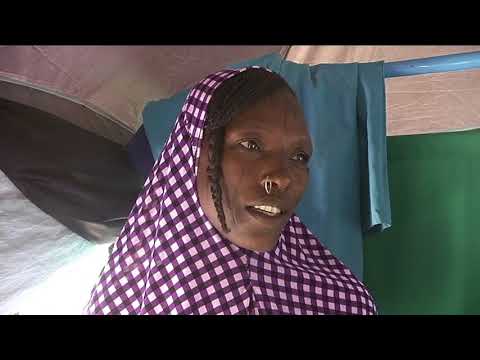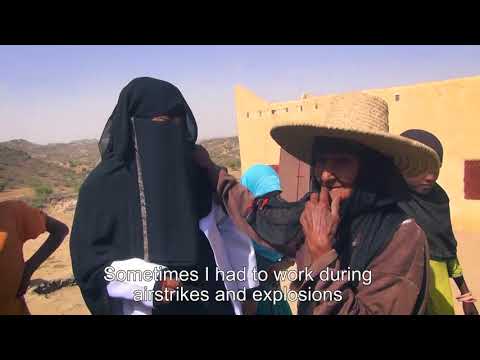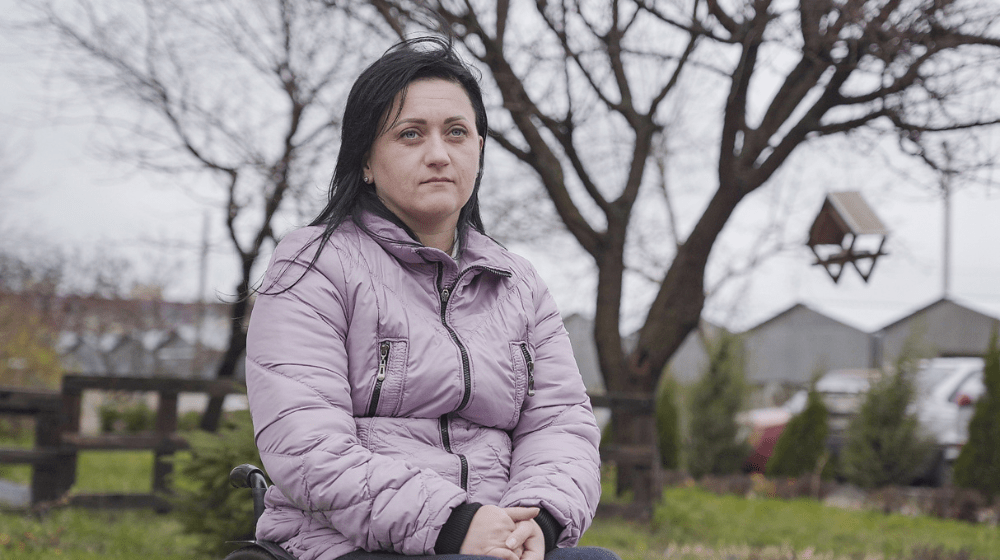Natalya is from the city of Cherkasy. Now she sews, works on a sewing machine and paints. Previously, she had many different jobs, but in 2015, an accident happened - Natalya suffered a spinal cord injury.
After that, her life changed radically. She needed to use a wheelchair. But, as well as this, she experienced domestic violence.
How exactly did Natalya manage to adapt to a new life, break the cycle of violence, and discover herself amidst such difficulties? She talked about this with the UN Population Fund in Ukraine (UNFPA).

Three years of domestic violence
Before the injury, Natalya was in a relationship for 5 years. But it was only when she got to the hospital that she realized that she had not wanted to see what was really happening to her.
At the beginning of the relationship Natalya and her husband lived in their own, separate, apartment. But soon, her husband's mother insisted that the three of them live together: she had a spare room and why pay extra rent if you can live together? The couple decided that it would be rational and moved out of their rented apartment.
At first, everything was fine, but gradually well-meaning advice from the husband's mother turned into constant remarks and complaints. Any negative event was twisted in such a way that Natalya became the culprit. And then there was emotional and psychological pressure. During one of these phases, her husband's mother even attacked
Natalya, because she didn't like everything Natalya did.
"There was no clear beginning when violence happened for the first time. Everything happened gradually; every time there were some changes. At first, I didn't pay attention to it, I thought that as I was on someone else's territory in someone else's apartment, what right did I have to lead? So, I just took all the comments as if they were pieces of advice. After some time, I began to realize that this was not advice, but complaints.
One day she could praise me - how well I cooked, especially if one of her acquaintances came to visit. And then after a couple of days, there would be a very strong manifestation of aggression in my direction, as if I was doing something wrong. I don't know if it depended on her mood or something else, but it came in waves. I lived like this for about three years," Natalya says.
An injury that showed what exactly should be changed in life
According to Natalya , it is not her nature to shout back or make a scene. Usually, in conflict situations, she withdraws into herself or may burst into tears. When Natalya told her husband that it was difficult for her, that she was constantly in tears, he only told her not to pay attention. He took a neutral position and did not say anything to his mother.
Natalya's injury "helped" to break this circle. While she was in the hospital and recovering from anaesthesia, she was very sick. Her husband did not try to help, visited very rarely and was generally ashamed to come. During that period, Natalya was helped by other people - colleagues from work, friends, and relatives. But not him.
Once, her husband's mother visited Natalya in the hospital and said that her son was still young and would not take care of Natalya. This was the last straw for her, and she realized that this was the end of the relationship.
And at the moment when she knew she had to make the decision to break up, it had already happened by itself. Natalya says that she did not understand how she could have ignored and tolerated such treatment for so long, and most importantly - not noticed exactly how she was treated.

A period of self-discovery
After Natalya's injury, it was difficult to find a job, and it took several years to adapt. She is a drawing teacher and designer by education. When the injury happened, she could not draw - her creativity manifested itself only in sewing. That is why she decided to study and became a seamstress.
During her job search, she discovered that most enterprises are not suitable and accessible as workplaces for people with disabilities. Most often, the reason was the location - whether on the 2nd floor or in the basement.
Once, on an excursion in her city, Natalya met Elena, who advised her on a creative training programme for people with disabilities, and later offered her employment at her own company.
The company was engaged in sewing products and had a lot of industrial machines that you need to control with your feet. But the injury that Natalya had received meant she could not work with her feet and operate an industrial sewing machine. Only household sewing machines, which are usually not installed in production lines, were suitable for Natalya to work on.
How the "VONA hub" project helped Natalya
The "VONA hub" project was able to help Natalya with her job search. It is aimed at developing the professional potential and financial capacity of women who have suffered or are at risk from domestic / gender-based violence.
Also, within the framework of the work of the hub, thanks to the support of the Government of Great Britain, it was possible to realize the creation of social enterprises in 10 cities in Ukraine. As part of this financing, the necessary equipment was purchased for Elena's enterprise, namely manual sewing machines that can be used by people with disabilities.
And in order for Natalya to work comfortably, the equipment was installed at her home, since in rainy or snowy weather it is difficult to leave the house and move around the city in a wheelchair. This helped her to improve the quality of products and the speed of order fulfilment.

Why is financial independence important?
"The very lack of financial independence is very often an obstacle to leaving an abusive husband or family. This is both my story and that of my acquaintances - when they were afraid to leave a relationship because they understood that you cannot pull out on your own. When you're in a couple, it's still easier, but when you're completely alone and don't have your own home... The help I received from the "VONA hub" project gave me the opportunity to feel freer and more independent. I realized that thanks to this I can manage my life, and I don't have to answer to someone else ," Natalya told us.
Two months after the full-scale invasion, Natalya began working with a sewing shop as a volunteer, helping to sew uniforms for the military. Later, the enterprise received a large order and she transferred to them for permanent work.
"If the violence is already happening and continues, it will not disappear. And you must not console yourself with the idea that something will change tomorrow. If this happens systematically and has happened more than once, nothing will change. You either accept and live as a victim, or you find strength and go on to change.
I believe that such projects as "VONA hub" are extremely important. This is support when it is difficult to make a decision on your own. You communicate with people with similar stories and situations. Thanks to this, you can see a possible solution for your situation," Natalya shares her impressions.
The "VONA" career hub is implemented by UNFPA with the financial support of the Embassy of Great Britain and the USAID Bureau of Humanitarian Assistance (BHA).


